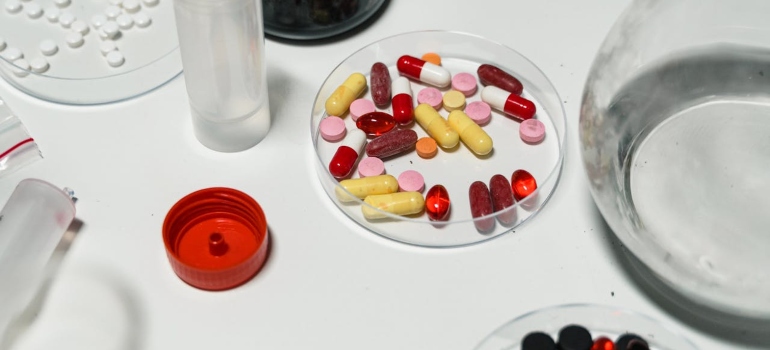When discussing Synthetic vs Organic Drugs, it’s essential to understand their differences. Synthetic drugs, like aspirin and ibuprofen, are chemically manufactured in labs to imitate or boost natural substances. Also, their role can be to create new compounds for medical use. Conversely, organic drugs are directly derived from natural sources, such as plants, animals, or minerals. They only sometimes have minimal chemical alteration. For instance, we have morphine, extracted from opium poppies, and digitalis, derived from the foxglove plant. For those seeking treatment and guidance on drug use, Harmony Ridge Recovery Center WV offers comprehensive care customized to individual needs.
Synthetic vs Organic Drugs: Myth 1- Organic Drugs Are Always Safer Than Synthetic Drugs
One of the most popular myths is that organic drugs are naturally safer than synthetic ones. The reality is that the safety of any drug depends on its chemical properties, dosage, and how people use it. Misusing a drug, regardless of its source, can lead to harmful or even toxic effects. For example, morphine, an organic drug derived from the opium poppy, is effective in pain management. However, it can also cause severe addiction and respiratory depression.
Conversely, synthetic drugs like ibuprofen are generally safe when people follow the instructions on their usage. Still, they can cause stomach ulcers or kidney damage if people overuse them. Another example is digitalis, an organic drug from the foxglove plant, which can be life-saving in the right doses, but also deadly if you overdose. Synthetic medications like metoprolol, a beta-blocker for heart conditions, also have side effects. However, they are often more predictable and manageable under medical supervision. For those needing comprehensive care, a residential treatment center in West Virginia can provide essential support.

Synthetic vs Organic Drugs: Myth 3- Organic Drugs Have Fewer Side Effects
Many believe that organic drugs have a better influence on the body and have fewer side effects when we compare them to synthetic drugs. However, all drugs, whether artificial or organic, can cause side effects. Moreover, these effects vary depending on the individual and the drug. For instance, digitalis, an organic drug from the foxglove plant, is efficient in treating certain heart conditions but can also cause serious side effects like nausea, dizziness, and life-threatening heart arrhythmias. On the synthetic side, drugs like beta-blockers may cause side effects such as fatigue and cold hands but people often tolerate it better. In a partial hospitalization program West Virginia, doctors carefully manage such side effects. Another example is St. John’s Wort, a natural herb often used for depression. While considered safe by some, it can dangerously interact with other medications like blood thinners or birth control pills.
Myth 4: Synthetic Drugs Are Chemically Unnatural
A widespread misconception is that synthetic drugs are chemically unnatural and therefore harmful. In reality, synthetic drugs are often created to imitate natural substances or create new compounds that the body processes similarly to organic drugs. By making sure meds are both effective and safe, medicinal chemistry has become very important these days. For instance, aspirin, a synthetic drug, comes from salicylic acid found in plants and functions similarly to its natural counterpart. Furthermore, we can customize synthetic drugs to reduce harmful side effects, making them safer for long-term use in some cases. This scientific approach to drug development challenges the belief that synthetic equals unsafe. For those struggling with substance use, including the misuse of synthetic drugs, specialized treatment programs, such as stimulants rehab, offer a structured environment for recovery. These programs emphasize the importance of understanding how drugs affect the body.
Synthetic Drugs: Modeled After Nature
A classic example of synthetic drugs is aspirin, modeled after salicylic acid, a natural compound found in willow bark. Aspirin’s purpose is to provide the same pain-relieving effects as willow bark but with fewer gastrointestinal side effects. Also, synthetic hormones like insulin are designed to mimic the body’s natural insulin, offering life-saving treatment for people with diabetes. These synthetic drugs show that while they may be chemically engineered, they are not “unnatural” and harmful. Instead, they are carefully crafted to interact with the body in ways often modeled after natural processes. Hence, that modulation is making them an essential part of modern medicine. For those dealing with substance use, realizing the role of synthetic drugs is crucial, and individual therapy for addiction can provide the personalized support that people need. Such therapy helps individuals make good choices about their treatment.

Organic Drugs Are Less Addictive- Myth Number 5
A common belief is that organic drugs are less likely to lead to addiction than synthetic drugs. However, the potential for addiction has more to do with how a drug affects the brain’s reward system than its origin. Both organic and synthetic drugs can be addictive if they trigger strong feelings of pleasure or even euphoria. For instance, organic substances like opium, derived from poppies, can be highly addictive due to their powerful effects on the brain. Similarly, some of the most dangerous synthetic drugs, such as synthetic opioids, are producing intense euphoria. This demonstrates that addiction risk has everything to do with a drug’s impact on brain chemistry. Understanding this helps debunk the myth that organic drugs are inherently safer in terms of addiction potential, putting an accent on the importance of careful use and professional guidance regardless of a drug’s origin.
The Addictive Potential of Organic and Synthetic Drugs
People have used opium for centuries for pain relief but is highly addictive. Then, that led to the development of synthetic derivatives like heroin, which is even more potent and addictive. Moreover, on the synthetic side, drugs like methadone are used in opiate addiction treatment because they can reduce withdrawal symptoms without the euphoric high that leads to abuse. Even natural substances like caffeine, found in coffee and tea, can be addictive. While not as severe as opioid addiction, caffeine dependence is a common issue. Thus, caffeine dependence illustrates that the natural origin of a substance does not necessarily make it less addictive. These examples demonstrate that both organic and synthetic drugs can pose addiction risks, challenging the notion that natural substances are safer. Understanding the addictive potential of both types of drugs is essential if you don’t want to fall into the addiction trap.

Synthetic vs. Organic Drugs: Environmental Impact
The environmental impact of producing synthetic vs. organic drugs is a significant consideration. Synthetic drug production often includes complicated chemical processes that can lead to pollution. Despite these challenges, these processes are usually highly controlled, with efforts to minimize environmental damage. On the other hand, harvesting organic drugs comes with its environmental concerns. That means that overharvesting of certain plants, for example, can lead to the depletion of natural resources and loss of biodiversity. As such, organic vs synthetic drugs include more than just comparing their medical effects. Moreover, it also requires evaluating their ecological footprints. Sustainable farming practices and ethical sourcing are vital for lessening these environmental impacts. By adopting these practices, the negative effects of harvesting organic drugs can be reduced.
Ethical Issues in Drug Production
Ethical considerations are essential in the production of both synthetic and organic drugs. The use of natural resources, animal testing, and accessibility are significant factors in this context. Scientists develop some synthetic drugs by using methods that do not involve animal products. Thus, the fact that they don’t use animals is making them more ethically acceptable to certain groups. On the other hand, organic drugs often rely on plant sources, and their accessibility can be very low in regions where these plants do not grow naturally. Hence, if the plants do not grow naturally in those areas, it can potentially lead to increasing costs and availability issues. Balancing these ethical and environmental considerations is crucial for the responsible development and use of both synthetic and organic drugs. By addressing these issues, the pharmaceutical industry can work towards more ethical practices.

Choosing the Right Type of Drug: Professional Guidance and Informed Decisions
When choosing between synthetic and organic drugs, consulting with healthcare professionals is important. They can offer relevant customized advice following your medical history, current conditions, and overall health goals. Moreover, this expert guidance ensures that the treatment is both safe and effective, regardless of its origin. Alongside professional advice, consumers should also focus on understanding drug labels. This includes identifying active ingredients, potential side effects, and any possible interactions with other medications or supplements. When you know more about the components of a drug, whether synthetic or organic, it empowers you to make more informed decisions about their treatment options. By combining the expertise of healthcare providers with a thorough understanding of drug labels, individuals can manage their choices more effectively, ensuring that their treatment aligns with their specific health needs.

Recap of Synthetic vs. Organic Drugs Myths and Realities
Both synthetic and organic drugs have valuable roles in modern medicine. Therefore, understanding the realities behind these myths is crucial for making well-informed health decisions. By recognizing that the classification of a drug as synthetic or organic does not necessarily dictate its efficacy or safety, individuals can better evaluate their treatment options. Ultimately, the best approach to choosing between synthetic and organic drugs is to rely on science and consult with healthcare providers. This ensures that people choose the most suitable and effective treatments tailored to their specific health needs, balancing both the advantages of synthetic and organic options to achieve optimal outcomes.




